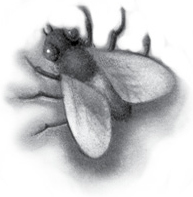
Isaac refused to admit to sneaking into Hadley’s room and playing with the dolls. He was always messing with her stuff, moving things around, borrowing things—even after she’d told him a thousand times to stay away. She’d never had to share anything before. It was still a new concept for her.
To keep Isaac away from her things, Hadley helped him fly his kite. She tried to play catch with him, but she wasn’t very good. Instead they played badminton and croquet with rusty equipment they found in a box behind a recycling bin in the garage.
Gabe came over every morning. With nothing better to do, Hadley joined him. Together they explored the upper edge of the ravine, and even wandered into the woods along the intertwining trails. Despite his intense love of creepy-crawlies, he was beginning to grow on her.

“What’s that?” he asked.
Hadley stood at the edge of her yard, holding the eye up to the sun. Light shone through it, casting lacy patterns on the grass. “An eye.” She tucked it back into her pocket.
“Where’d you find it?” he asked excitedly. “Did you excavate it?”
“Actually, it sort of found me,” she responded vaguely. “In the house.”
His expression collapsed. Clearly he was expecting a more exciting response. He focused his attention on a worm that had strayed onto a rock.
“Did you know, in terms of sheer number, insects are the most dominant life form on Earth?”
“Nope.”
“Actually, they appeared over four hundred million years before humans.”
“Marvelous,” said Hadley. “So, er, how long have you lived here?” she asked, swatting at a fly. There seemed to be an extraordinary number of flies near the edge of the ravine.
Gabe picked up the worm, dug a small hole, and placed it inside. He pushed soil over the top, patting it gently so as not to harm the worm. “On the earth?”
Hadley rolled her eyes. “In your house.”
“All my life,” he said. “I was born in my house.”
“I was born in a hospital,” said Isaac, swooping in behind them, diving headfirst into the conversation.
“He didn’t mean he was actually born in the house, silly,” said Hadley.
Isaac watched Gabe’s every move, trying to imitate him. Except that Isaac dug up a worm first in order to rebury it, which sort of defeated the whole rescue purpose.
“I was born in my house,” said Gabe. He found another insect in distress—a beetle being attacked by ants. He dusted off the scavengers and set the creature on its way. “In the living room, to be precise. My mother’s never had a great sense of timing. She’s kind of spatially challenged, too. One time”—he chuckled—“she tried to fit a whole pineapple into a blender. And then she forgot the lid and…”
A sunset flushed across his cheeks as he explained in great detail the disastrous results of the un-lidded blender episode.
“So, where are your parents anyway?” Hadley asked, trying hard to sound casual.
“They travel a lot. For work.”
“Really? What do they do?”
“Mom is a nuclear engineer,” said Gabe. “Dad’s a long-haul trucker.”
“Wow,” said Hadley, eyeing Gabe with newfound respect. “So, what do they have in common?”
“Fuel.”
Gabe then subjected Hadley to several more bug stories seriously lacking plots. She listened quietly and even reluctantly helped with his experiments.
First, they placed half a teaspoon of sugar near an anthill and timed how long it took for the ants to notice. Next, they placed some honey on a tree trunk to see what sort of insect would be attracted first. Hadley hoped for a butterfly. But all they got were tons of flies. And more ants.
As the days passed, Hadley kept a watchful eye on the room above the garage, hoping to steal a glimpse of Althea S. de Mone. One day, Hadley nearly went right up to her door and knocked, but her mother stopped her. She said not to pester Ms. de Mone—she was old and needed plenty of peace and quiet.
“She knew my name,” said Hadley one morning at breakfast.
“What’s that?” her mother asked, pouring yet another bowl of Flaxy O’s.
Hadley sighed. Aside from tasting like wood chips, the cereal had a horrible effect on her digestive system.
“She said she knew her name,” echoed Isaac. He grinned at Hadley before shoveling a truckload of cereal into his mouth. He chewed loudly. Just like Ed. Hadley decided it must be genetic.
“Who knew whose name?” asked her mother. She was distracted by her kitchen cleanup and didn’t appear to be following the conversation too closely.
“Ms. de Mone,” said Hadley. “The day she came, she called me by my name before you introduced me.”
“She heard me say it when I came to the door.”
“But you didn’t.”
Her mother frowned. She stopped scouring the sink and stared at the ceiling as though replaying the scene in her mind. She waved a dismissive hand in the air like she was swatting a fly.
“I told her about you before that morning, Haddy. I told her all about you when we first met, the day Ed and I brought her the documents to sign the lease.”
“But…” said Hadley, “how did she know it was me? She can’t see, can she?”
“She’s not blind,” said Hadley’s mother. “She’s only visually impaired. Bright lights bother her. Now stop imagining things. She’s a lovely lady. The perfect tenant. She’s even invited you for afternoon tea. She said something about having baked a crumble…”